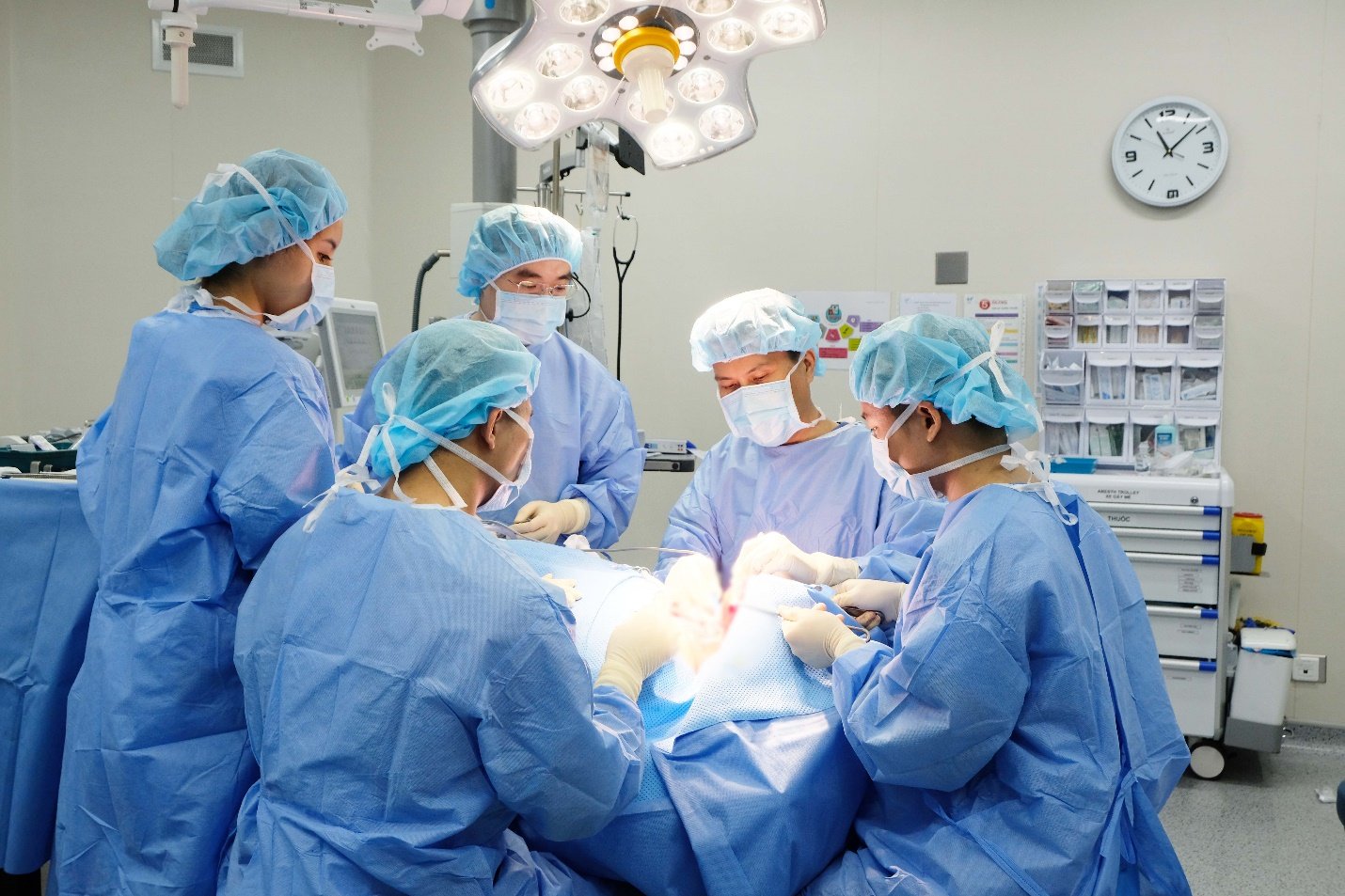Risk of metastasis due to failure to treat laryngeal cancer promptly
After suffering from hoarseness for more than 3 months, Mr. BVT (patient's name has been changed), 76 years old, living in Hanoi, went to the hospital for a check-up. He and his family were very surprised when he was diagnosed with laryngeal cancer.
Dr. Vu Duy Khanh, Department of Otorhinolaryngology, Hanoi French Hospital, who examined and directly participated in the patient's surgical team, said: "The patient came to the clinic with a persistent hoarseness that gradually increased over 3 months. During an ENT endoscopy, the doctor discovered a suspected cancerous tumor in the larynx. The patient was transferred for a biopsy under anesthesia. The histopathological result was squamous cell carcinoma of the right vocal cord."
In order for doctors to determine the specific stage of the disease and have the most effective treatment, the patient is prescribed a chest-neck CT scan, neck ultrasound and gastrointestinal endoscopy to rule out the possibility of secondary tumors.
The tests showed that this was a subglottic laryngeal cancer stage T3, N0, M0, if not treated promptly, there was a risk of further metastasis to other organs of the body. After consultation, the doctors decided to perform a total laryngectomy and bilateral neck lymph node dissection for the patient. After surgery, depending on the condition, the patient may receive additional chemotherapy and radiotherapy.

After 3 months of persistent hoarseness, the patient was diagnosed with laryngeal cancer and needed surgery.
For laryngectomy surgery, the challenge for doctors is that major blood vessels and important nerves are concentrated in the neck area, so the surgical team not only needs to remove the diseased area, but also must ensure that there are no sequelae for the patient after surgery, Dr. Khanh said.
The surgery lasted more than 3 hours at the Vietnam - France Hospital in Hanoi. With the experience of the surgical team and modern equipment, the surgery went as planned, the patient's condition was stable. After the surgery, during the hospitalization, due to the underlying disease of blood pressure and diabetes, the patient was monitored and treated by a multidisciplinary team of ENT, Nutrition, Endocrinology, and Cardiology to ensure a quick recovery. 14 days after the surgery, the patient's health was stable, the examination showed no indication for chemotherapy or radiotherapy, only periodic check-ups were needed.
Prevention and early detection of laryngeal cancer
Laryngeal cancer occurs when malignant cells form in the laryngeal tissue. The disease is mainly common in men, accounting for over 90%; the common age is from 50 to 70 years old.
In the early stages, the disease does not have obvious symptoms, so patients often ignore or mistake it for other common diseases. Symptoms may include hoarseness, dry cough, throat discomfort, feeling like there is a foreign object stuck in the throat, swallowing disorders, difficulty breathing, etc. In particular, hoarseness is an early and common symptom of laryngeal cancer, manifested by a hoarse voice, lasting and increasing, not being relieved by medication.

The disease is mainly common in men, accounting for over 90%; the common age is from 50 to 70 years old. Illustrative photo
Some factors can increase the risk of the disease, including: smoking and drinking alcohol regularly, family members with head and neck cancer, history of HPV infection. In addition, there are some other diseases that increase the risk of laryngeal cancer such as gastric reflux, laryngeal hernia, laryngeal papilloma.
Associate Professor, Dr. Vo Thanh Quang, a senior physician with more than 40 years of experience in the field of ENT surgery, Deputy General Director of the Hanoi French Hospital, said: "The effectiveness of laryngeal cancer treatment depends largely on the stage at which the disease is detected. If treated early, the patient can be completely cured, with a cure rate of 80%. However, if the disease is detected late, the patient may suffer losses such as having the entire larynx removed, affecting health and quality of life after surgery."
To prevent laryngeal cancer, doctors advise against tobacco and alcohol abuse and to have regular health check-ups. In particular, when there are signs of prolonged hoarseness, increasing in severity, and failure to respond to laryngitis treatment, early laryngeal cancer screening is needed.
To prevent and detect laryngeal cancer early, each of us needs to maintain a healthy lifestyle, not smoke, if drinking alcohol, drink in reasonable doses, and protect the living environment. In addition, it is necessary to perform periodic ENT endoscopy to detect precancerous lesions early. If there are signs of hoarseness lasting more than 1 month or not improving after medical treatment, the patient needs to have an ENT endoscopy to detect laryngeal cancer early and treat it promptly.
Source: https://giadinh.suckhoedoisong.vn/khan-tieng-keo-dai-3-thang-nguoi-dan-ong-o-ha-noi-bat-ngo-khi-biet-minh-bi-ung-thu-thanh-quan-172240612113455438.htm




![[Photo] Bustling Mid-Autumn Festival at the Museum of Ethnology](https://vphoto.vietnam.vn/thumb/1200x675/vietnam/resource/IMAGE/2025/10/4/da8d5927734d4ca58e3eced14bc435a3)

![[Photo] General Secretary To Lam attends the 8th Congress of the Central Public Security Party Committee](https://vphoto.vietnam.vn/thumb/1200x675/vietnam/resource/IMAGE/2025/10/4/79fadf490f674dc483794f2d955f6045)
![[Photo] Solemn opening of the 8th Congress of the Central Public Security Party Committee, term 2025-2030](https://vphoto.vietnam.vn/thumb/1200x675/vietnam/resource/IMAGE/2025/10/4/f3b00fb779f44979809441a4dac5c7df)


















































![[VIDEO] Summary of Petrovietnam's 50th Anniversary Ceremony](https://vphoto.vietnam.vn/thumb/402x226/vietnam/resource/IMAGE/2025/10/4/abe133bdb8114793a16d4fe3e5bd0f12)
![[VIDEO] GENERAL SECRETARY TO LAM AWARDS PETROVIETNAM 8 GOLDEN WORDS: "PIONEER - EXCELLENT - SUSTAINABLE - GLOBAL"](https://vphoto.vietnam.vn/thumb/402x226/vietnam/resource/IMAGE/2025/7/23/c2fdb48863e846cfa9fb8e6ea9cf44e7)































Comment (0)